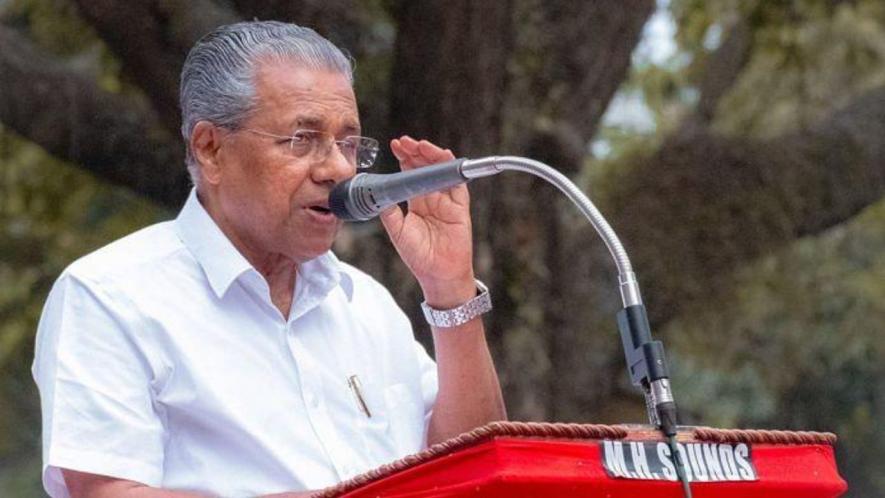Reinventing the Kerala Model

File photo of Chief Minister of Kerala Pinarayi Vijayan | Twitter/@vijayanpinarayi
Kerala, long heralded as a pioneer in social welfare and progressive governance, continues to forge a path of sustainable and inclusive development through a series of well-considered policy initiatives. In an era when states grapple with competing demands of economic growth, social equity and environmental conservation, Kerala’s governance model serves as a beacon for balanced policymaking.
The state’s latest efforts, especially those unveiled in early 2025, reaffirm its commitment to eradicating poverty, fostering a knowledge-driven economy, and crafting a sustainable urban future.
One of the most ambitious undertakings by the Kerala government is its goal to eliminate extreme poverty by November 2025. This initiative, which was formally announced in early January, is noteworthy for its scientific approach and comprehensive design. The government has identified approximately 64,000 families living in extreme poverty and plans to uplift them through targeted interventions.
The strategy involves financial assistance, improved access to education, healthcare, and skill development, as well as ensuring food security. The emphasis on addressing root causes rather than merely alleviating symptoms of poverty reflects a nuanced understanding of social welfare. Kerala’s consistent top-ranking position in the Human Development Index (HDI) is testament to the effectiveness of such targeted policies, and this new goal could further enhance its standing.
Complementing its social welfare initiatives, Kerala is making significant strides in building a knowledge-based economy. The state’s partnership with Coursera, a leading global online learning platform, exemplifies its forward-thinking approach.
Under the Kerala Knowledge Economy Mission (KKEM), the government aims to train three million individuals and create two million jobs by 2026. This ambitious plan includes the Talent Accelerator Programme, a three-month intensive training initiative targeting final-year students across 250 higher education institutions in the state.
By aligning educational outcomes with industry needs, Kerala seeks to bridge the employability gap and position itself as a hub for knowledge-intensive industries. In a world increasingly driven by digital and technological advancements, this initiative emphasises the state’s resolve to equip its youth with future-ready skills.
Further bolstering its digital economy ambitions, Kerala has also initiated a series of measures to promote artificial intelligence (AI) and emerging technologies. The state’s AI-focused policy framework, expected to be unveiled later in 2025, will provide incentives for startups and tech companies operating in this domain. By fostering an ecosystem conducive to innovation, Kerala aims to attract investment and talent in AI-driven sectors, thereby enhancing its economic prospects.
This initiative builds upon the state’s already impressive digital infrastructure and its reputation as a leader in e-governance. With over 80 e-governance applications currently operational, Kerala has streamlined public service delivery, reduced bureaucratic inefficiencies, and enhanced citizen engagement—a model that other states would do well to emulate.
Urbanisation, an inevitable consequence of economic growth, presents unique challenges that require deft handling. Recognising this, Kerala has approved a comprehensive urban design policy that seeks to enhance the quality of life in its cities while preserving ecological balance. The policy covers various aspects of urban development, including the design of roads, bridges, public spaces, and tourism infrastructure. By focusing on aesthetics, functionality, and inclusivity, the government aims to create urban spaces that are both liveable and environmentally sustainable. The policy also emphasises the need for eco-sensitive planning, a critical aspect in a state known for its fragile ecosystems and high population density.
Adding further depth to its urban planning efforts, Kerala is drafting a 25-year urban policy aimed at guiding the state’s growth trajectory over the next two decades. This policy envisions the creation of sustainable urban centres that harmonise economic vibrancy with environmental stewardship. The key components include investments in public transportation, waste management, and the preservation of green spaces. By adopting a long-term perspective, the state hopes to mitigate the adverse impacts of unplanned urban sprawl, a challenge faced by many rapidly urbanisng regions in India.
On the environmental front, Kerala’s commitment to sustainability is evident through initiatives such as the Haritha Keralam (Green Kerala) mission. This programme focuses on waste management, the rejuvenation of water bodies, and the promotion of organic farming. The government’s efforts in these areas have yielded tangible results, including improved sanitation coverage and increased agricultural productivity. Moreover, by integrating environmental objectives with economic policies, Kerala is demonstrating that economic growth and environmental conservation need not be mutually exclusive.
Another noteworthy development is Kerala’s draft Environmental, Social, and Governance (ESG) policy. Once implemented, it will make Kerala the first state in India to have a dedicated ESG framework for industries. The policy aims to promote responsible industrialisation by encouraging businesses to adopt sustainable practices and adhere to high standards of corporate governance. This move is expected to attract investors who prioritise ESG compliance, thereby enhancing the state’s appeal as an investment destination. At a time when global capital increasingly flows toward sustainable enterprises, Kerala’s proactive stance could provide it with a competitive edge.
In terms of fiscal management, Kerala’s budgetary allocations reflect its developmental priorities. Despite facing constraints, such as reduced revenue deficit grants and cuts in borrowing limits imposed by the Central government, the state has maintained a robust plan outlay. For 2024-25, the aggregate plan outlay stands at ₹38,886.91 crore, with a significant portion earmarked for infrastructure development, social welfare schemes, and economic initiatives. This fiscal prudence, coupled with targeted investments, ensures that the state’s developmental agenda remains on track.
One cannot overlook the role of community participation in Kerala’s developmental success. Be it the Kudumbashree movement, which has empowered millions of women through self-help groups, or the decentralised governance model that has strengthened local self-governments, Kerala’s emphasis on grassroots involvement has been a key factor in its achievements. The government’s recent efforts to train over 250,000 volunteers under the One Health initiative further highlight this commitment to community-driven development. By addressing the interconnectedness of human, animal, and environmental health, the initiative aims to create a holistic public health framework that can serve as a model for other states.
Kerala’s development narrative is one of balance—between growth and equity, tradition and modernity, human welfare and technological advancement. The state’s policy initiatives, rooted in a deep understanding of its unique socio-economic context, offer valuable lessons for policymakers across the country. By prioritising human capital development, promoting sustainable industrialisation, and ensuring environmental conservation, Kerala is charting a course that is both progressive and pragmatic.
Kerala’s recent policy initiatives exemplify a governance model that is responsive, inclusive, and forward-looking. While challenges remain—including fiscal pressures and the need to sustain economic momentum—the state’s proactive approach and commitment to long-term planning provide reasons for optimism.
As other states grapple with the complexities of development, Kerala’s experience stresses the importance of thoughtful policymaking and community participation in achieving sustainable progress. In a rapidly changing world, where socio-economic disparities and environmental degradation pose significant risks, Kerala’s governance model serves as a timely reminder that development, when pursued with vision and inclusivity, can indeed be a force for good.
The writer is a policy economist and as Parliamentary Secretary to a Rajya Sabha MP from Kerala, he drafted ‘The Bhagat Singh National Urban Employment Guarantee Bill, 2022’, introduced in the Parliament. X: @yadul_krishna. The views are personal.
Get the latest reports & analysis with people's perspective on Protests, movements & deep analytical videos, discussions of the current affairs in your Telegram app. Subscribe to NewsClick's Telegram channel & get Real-Time updates on stories, as they get published on our website.
























